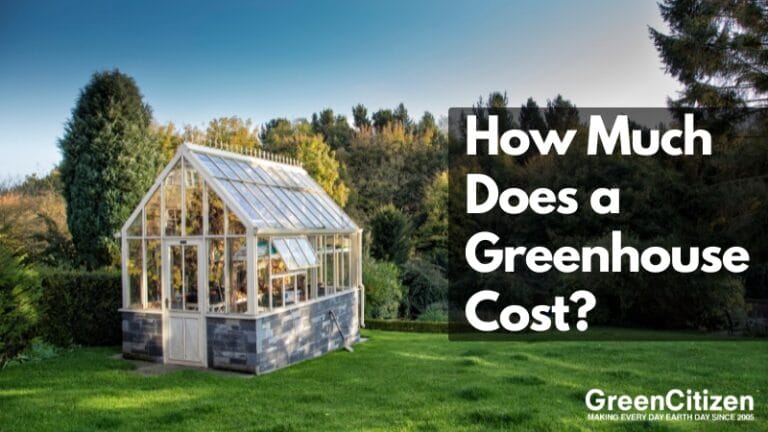The average cost to build a greenhouse is $13,000, though most homeowners spend between $5,000 and $25,000 depending on size and materials. For budget-conscious growers, a simple DIY hoop house can cost as little as $2,000, while high-end custom structures with automated climate control can exceed $40,000.
Your final greenhouse cost per square foot will largely depend on three factors: framing materials (aluminum vs. wood), glazing (glass vs. polycarbonate), and site preparation. Below, we break down the price of every component to help you budget for your green sanctuary.
Key Takeaways
- The Price Tag: The average cost to build a greenhouse is $13,000, with DIY hoop houses starting at $2,000 and custom glass structures exceeding $25,000.
- Biggest Cost Drivers: Your final price per square foot depends mainly on glazing material (polycarbonate vs. glass), framing type, and site preparation.
- Hidden Expenses: To calculate the true cost, you must budget for permits, utility hookups (water/electric), and ongoing heating costs for year-round growing.
Key Factors Influencing Greenhouse Costs
The primary factors affecting greenhouse pricing are size ($5-$35 per sq. ft.), framing materials (galvanized steel vs. aluminum), and glazing type (polycarbonate vs. glass). Additional costs include foundation installation ($3–$6 per sq. ft. for slabs) and utility hookups for water, HVAC, and electricity.
When determining your overall budget, several technical elements come into play. Here is a breakdown of the specific costs associated with construction and materials.
Size
This is the most straightforward factor. Generally, expect to pay between $5 to $35 per square foot. A hobbyist’s 50-square-foot kit might cost around $1,000, while a robust 1,000-square-foot structure could set you back $20,000 or more.
Style
The architectural design significantly influences the price. A basic hoop-style greenhouse is budget-friendly at $5 to $10 per square foot. In contrast, an A-frame or Victorian-style greenhouse, featuring intricate joinery and glass, costs between $25 to $35 per square foot.
Framing Materials
The frame determines the structural integrity, wind load capacity, and lifespan of your greenhouse.
- PVC Framing: The most economical choice ($0.50 to $2 per linear foot), but it offers the lowest durability.
- Galvanized Steel: Known for high strength and rust resistance, costing $2.50 to $3 per linear foot.
- Aluminum: A sustainable, middle-ground option that is lightweight and rust-proof ($1 to $2 per linear foot).
- Wood: Varies by timber type; requires regular maintenance to prevent rot.
Glazing Materials (Insulation & Light)
Your choice of glazing impacts both the R-value (insulation) and light transmission.
- Plastic/Polyethylene Film: Cheapest option ($0.10 to $0.50 per sq. ft.) but requires replacement every 3–5 years, creating more waste.
- Corrugated Fiberglass: Durable and diffuses light well ($1 to $2 per sq. ft.).
- Polycarbonate: Excellent impact resistance and insulation ($1.60 to $3 per sq. ft.).
- Glass (Double-Pane): The premium choice for aesthetics and longevity ($2.50 to $3.50 per sq. ft.).
Foundation and Flooring
A solid foundation prevents the structure from shifting.
- Gravel/Stone: Best for drainage ($1 to $3 per sq. ft.).
- Concrete Pavers: Aesthetically pleasing ($8 to $25 per sq. ft.).
- Concrete Slab: Essential for permanent, heavy structures ($3 to $6 per sq. ft.).
Utilities (HVAC & Plumbing)
If you plan to grow year-round, you must factor in operational systems.
- Plumber: $45 to $200 per hour for running water lines or drip irrigation.
- Electrician: $50 to $100 per hour for lighting and fans.
- Insulation/Cooling: Thermal screens cost $1.50 to $4 per sq. ft.
Permits and Zoning
Always check local zoning laws. Building permits for permanent structures typically range from $100 to $600, depending on your municipality.
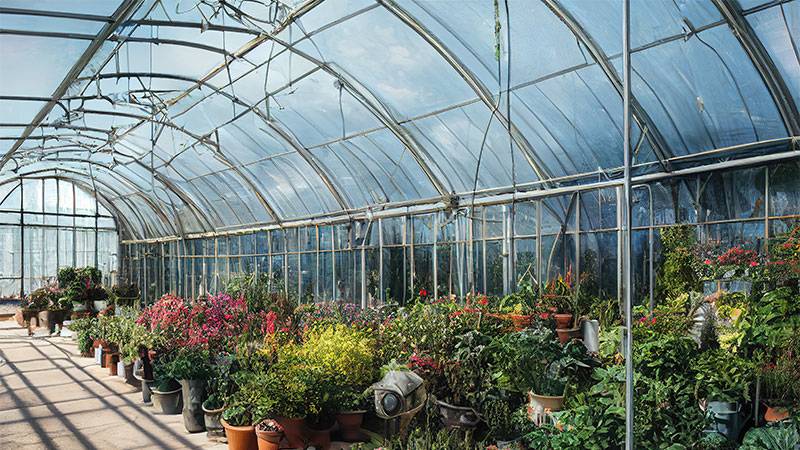
Average Greenhouse Cost by Size (Price Per Square Foot)
Greenhouse costs scale with size. A small 50 sq. ft. kit averages $1,000, while a standard 500 sq. ft. backyard structure ranges from $2,500 to $15,000. Commercial-scale greenhouses (1,000+ sq. ft.) generally start at $20,000 due to required structural reinforcement and automation systems.
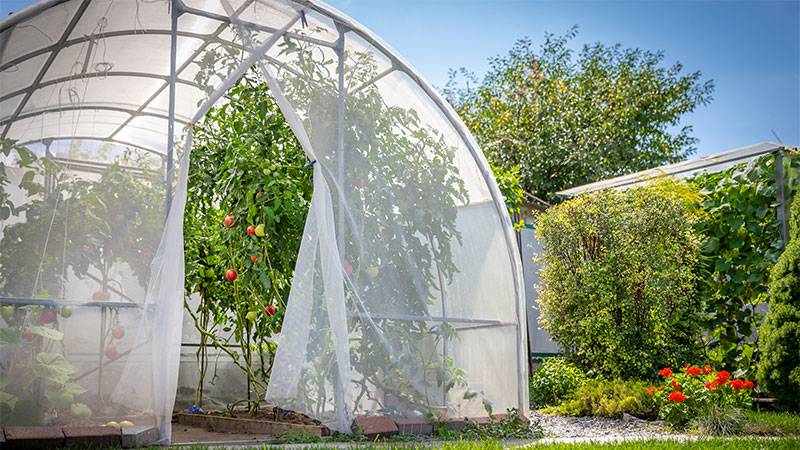
Whether you are looking for a small starter space or a commercial expansion, here is the typical pricing breakdown:
| Greenhouse Size | Average Cost Range |
|---|---|
| Small (up to 100 sq. ft.) | $500 - $3,000 |
| Medium (100-500 sq. ft.) | $2,500 - $15,000 |
| Large (500-1000 sq. ft.) | $10,000 - $30,000 |
| Commercial-Scale (1000+ sq. ft.) | Starting at $20,000 |
Note: Prices above vary based on whether you choose a prefab kit or a custom build.
Greenhouse Construction Costs by Type and Style
The style of greenhouse dictates the price. Hoop houses are the most affordable at $5–$10 per sq. ft. Geodesic domes and lean-to structures range from $10–$25 per sq. ft., while premium solar and A-frame glass greenhouses cost between $25-$45 per sq. ft. due to complex framing and glazing requirements.
Hoop-style Greenhouse Cost
- Cost: $5 – $10 per sq. ft.
- Why: These use simple steel arches and plastic sheeting. They are excellent for wet climates as snow and rain slide off easily, but offer lower insulation.
Rooftop Greenhouse Cost
- Cost: $10 – $25 per sq. ft.
- Why: While they save land, costs are driven up by the need for a structural engineering report to ensure the roof can support the added weight.
Geodesic / Dome Greenhouse Cost
- Cost: $10 – $25 per sq. ft.
- Why: The unique geometric shape is highly resistant to wind and snow loads, but the complex connector kits and frame assembly increase the price.
A-frame Greenhouse Cost
- Cost: $25 – $35 per sq. ft.
- Why: The classic “house” look usually utilizes glass panels and a concrete foundation, requiring more expensive materials and skilled labor.
Lean-to Greenhouse Cost
- Cost: $10 – $25 per sq. ft.
- Why: By sharing a wall with your home, you save on materials. However, flashing and waterproofing the connection point is critical to prevent home damage.
Gothic Arch Greenhouse Cost
- Cost: $10 – $15 per sq. ft.
- Why: Similar to hoop houses but with a pointed roof. The slight price increase covers the specialized bent framing required for the arch.
Pit Greenhouse Cost
- Cost: $20 – $25 per sq. ft.
- Why: These utilize the earth’s thermal mass for insulation. The cost is higher due to the excavation and retaining wall construction required.
Solar Greenhouse Cost
- Cost: $35 – $45 per sq. ft.
- Why: These are optimized for passive solar heating. The high cost comes from specialized glazing, thermal mass storage (like water barrels or stone), and advanced ventilation systems.
Ongoing Greenhouse Operating Costs
Beyond construction, owners must budget for operating costs. Heating a greenhouse in winter can cost $10–$50+ per month, while replacing UV-degraded plastic sheeting costs hundreds every few years. Water usage and electricity for grow lights also impact the long-term budget.
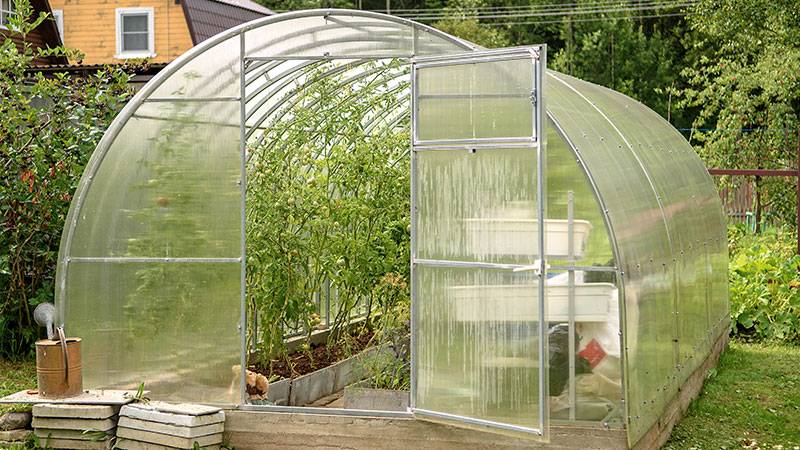
To truly answer “how much does a greenhouse cost,” you must look at the lifecycle expenses:
- Heating & Cooling: Depending on your climate zone and insulation (R-value), keeping a greenhouse warm in winter can significantly increase energy bills.
- Maintenance: Polycarbonate panels typically last 10–15 years, while polyethylene film needs to be replaced every 3–5 years.
- Water: Automated drip irrigation systems reduce waste but require initial setup and occasional repairs.
Is a Greenhouse Worth the Cost? (ROI and Value)
While the initial greenhouse cost is significant, the ROI includes extended growing seasons and lower grocery bills. A well-built greenhouse increases property value and protects crops from climate volatility, reducing food waste and pest management costs over time.
Year-round Cultivation
The biggest financial benefit is the ability to grow food year-round, reducing reliance on grocery stores.
Weather & Pest Control
A controlled environment mitigates the risk of crop failure due to frost, hail, or pests. This stability is invaluable for those who rely on their harvest for food or income.
Sustainable Living
For GreenCitizen readers, the value goes beyond money. Growing your own produce reduces your carbon footprint associated with food transport and packaging.
DIY Greenhouse Kits vs. Professional Installation Costs
Building a DIY greenhouse kit saves on labor, costing $500 to $5,000 total. Hiring a professional greenhouse builder ensures code compliance and proper foundation pouring, but increases the budget to $10,000+. Labor typically accounts for 30-40% of the total project cost if outsourced.
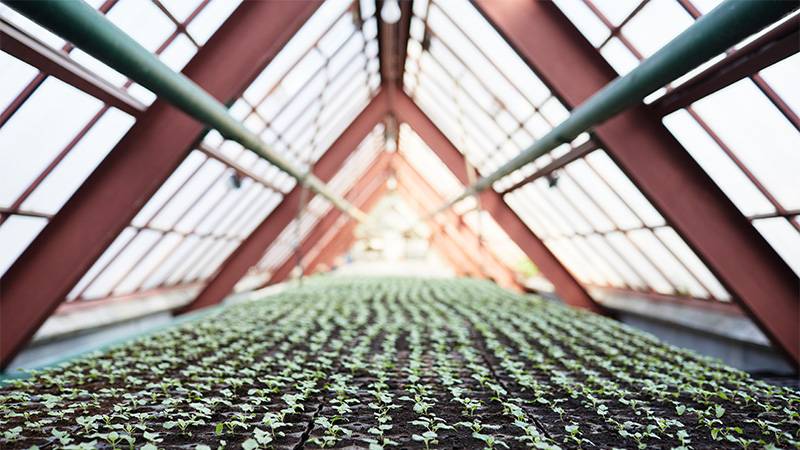
Going the DIY Route
- Pros: Significant cost savings; satisfaction of building.
- Cons: Requires tools and time; warranty may be void if assembled incorrectly.
- Best For: Hoop houses, small polycarbonate kits, and temporary structures.
The Professional Touch
- Pros: Guarantees structural integrity; handles permits and inspections; ensures proper utility installation.
- Cons: Higher upfront cost.
- Best For: Glass greenhouses, large structures requiring concrete slabs, and setups with electrical/plumbing needs.
Budget Tips: How to Reduce Greenhouse Building Costs
To lower greenhouse costs, utilize recycled materials like reclaimed windows or PVC pipes. Opt for gravel foundations (1–3/sq.ft.) over concrete slabs. Purchasing materials in the off-season (late fall) and sourcing locally to avoid shipping fees can also significantly reduce expenses.
- Economical Materials: Use recycled windows or PVC pipes. While plastic sheeting is cheap, consider that it generates more waste over time than glass or aluminum.
- Sales & Discounts: Look for end-of-season sales at garden centers (typically late fall/early winter).
- Community Resources: Check for government grants related to sustainable agriculture or urban farming.
Frequently Asked Questions (FAQ)
Generally, building a greenhouse from raw materials (DIY) is cheaper than buying a pre-fabricated kit, provided you have the construction skills. However, cheap kits (under $500) are often less durable than custom-built wood frames.
A 50-foot-long hoop house (approx. 500-750 sq. ft.) typically costs between $2,500 and $5,000 using steel tubing and polyethylene film.
Yes, if utilized for year-round growing. The ROI comes from reduced grocery costs, higher plant survival rates, and increased property value for permanent, well-maintained structures.
Plastic hoop houses last 3–5 years before re-skinning. Polycarbonate structures last 15–20 years. High-end glass greenhouses on a concrete foundation can last 50+ years with proper maintenance.
Cheap "pop-up" greenhouses ($50–$200) are good for starting seedlings but typically only last 1–2 seasons and offer poor wind resistance. They are a temporary solution, not a long-term investment.
Conclusion
Understanding how much a greenhouse costs requires looking beyond the sticker price of a kit. You must consider the foundation, installation, and ongoing energy costs. While the investment ranges from a modest $1,000 DIY project to a $25,000 architectural feature, the return—in fresh produce and peace of mind—is often invaluable.
Ready to start your sustainable gardening journey? Thorough research and a clear budget are your best tools. Dive deeper, compare your glazing options, and build a green sanctuary that lasts.
